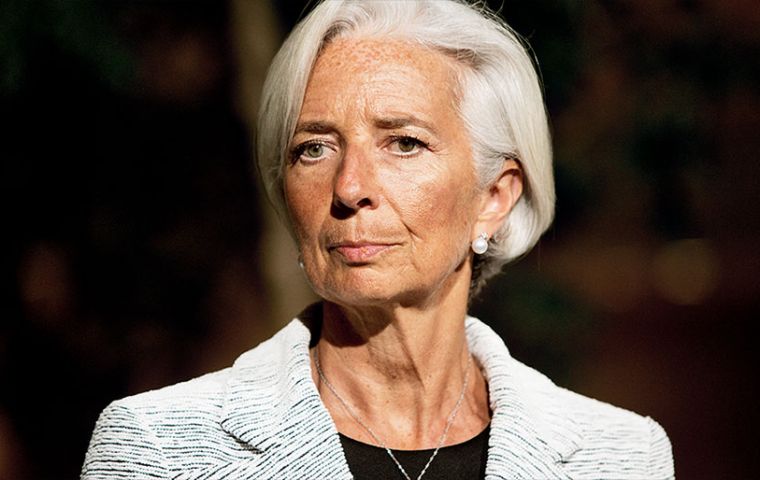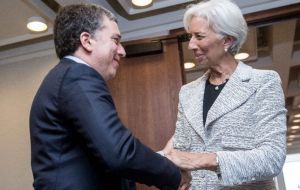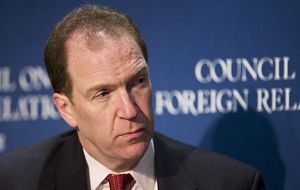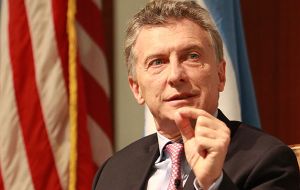MercoPress. South Atlantic News Agency
IMF and White House support Macri's economic reform program
 “I stressed my strong support for Argentina's reforms to date, and expressed the Fund's readiness to continue to assist the government,” Lagarde said
“I stressed my strong support for Argentina's reforms to date, and expressed the Fund's readiness to continue to assist the government,” Lagarde said  Lagarde/Dujovne discussed “how IMF can best help the authorities strengthen the Argentine economy in light of renewed and significant financial market volatility.”
Lagarde/Dujovne discussed “how IMF can best help the authorities strengthen the Argentine economy in light of renewed and significant financial market volatility.”  Dujovne also met on Thursday with US Treasury Under Secretary for International Affairs David Malpass
Dujovne also met on Thursday with US Treasury Under Secretary for International Affairs David Malpass  White House said US supports the economic reform program of president Macri which is market-oriented, growth-focused, and has improved Argentina’s future”
White House said US supports the economic reform program of president Macri which is market-oriented, growth-focused, and has improved Argentina’s future” International Monetary Fund chief Christine Lagarde said on Thursday she is ready to aid Argentina and wants talks on a financing package to be finalized quickly. Lagarde said she instructed the IMF team to continue discussions on a loan program with the goal to “reach a rapid conclusion.”
“I stressed my strong support for Argentina's reforms to date, and expressed the Fund's readiness to continue to assist the government,” she said in a statement following her meeting with Argentina Economy Minister Nicolas Dujovne.
Despite the reform efforts, Argentina once again finds itself facing a falling currency, high debt and soaring inflation. Recent market turbulence has rocked Latin America's third-largest economy, prompting President Mauricio Macri to announce on Tuesday that he would request IMF help as a “preventative” measure.
Lagarde said she and Dujovne discussed “how the IMF can best help the authorities strengthen the Argentine economy in light of renewed and significant financial market volatility.”
Dujovne also met on Thursday with US Treasury Under Secretary for International Affairs David Malpass, who “reiterated strong support for the Macri administration's market-oriented reform program.”
Treasury said in a statement that he welcomed the talks with the IMF. US support is key since it holds veto power in the IMF. Argentina is seeking a high access “stand by” financing arrangement which would provide funds above the normal loan amount, but officials have not said how much they are requesting.
IMF stand-by loans last for up to three years, but more usually last 12-24 months. They require regular reviews by IMF staff to make sure the government is following through on reform commitments and meeting targets for things such as spending cuts and pension reforms.
As US interest rates rise, investors in recent weeks have been fleeing Argentina, driving up demand for US dollars, and driving the peso down.
Going to the IMF is a risky move for Macri, given the bitter history the country has with the Washington-based lender, and the negative views on the conditions the fund might require.
Meanwhile the White House said on Thursday that United States supports president Mauricio Macri’s economic reform program..
“The United States supports the economic reform program of President Mauricio Macri of Argentina, which is market-oriented, growth-focused, and has improved Argentina’s future,” the White House statement said.
“President Macri has the right vision for the Argentine economy and has made important strides towards modernizing the country’s economic policy,” it said.




Top Comments
Disclaimer & comment rules-

-

-

Read all commentsIt comes down to Macri and his government being able to transform those $ 30 billion in to productive resources to enable paying off the loan...if he uses the loan to finance improductive activities (as listed by EM), forget it.
May 16th, 2018 - 04:08 pm +1@EM
May 11th, 2018 - 07:50 pm 0In keeping with my decision to not harass you over your opinions on Macri’s economic policies - which does not imply I can't make general comments on Argentina’s economic woes, every now and again - would just like to make a small comparison, regarding a political figure you complain that I defend…but before I go on, I would like to reiterate that I AM convinced Temer is a crook....very crooked.
That said, let’s take a look at Brazilian inflation over the Dilma years : 2011 – 6.5%, 2012 – 5.8%, 2013 – 5.9%, 2014 – 6.4%, 2015 – 10.7%, 2016 – 6.3%, ;
In 2017, Temer’s first full year in office , inflation dropped to 2.95%...Am not turning a blind eye to his corruption, far less to the consequences of the recession (which in a way, contributed to the inflation rate), but got to give it to him, he appointed a Minister of Finance and a president of the Central Bank who knew/ know what they were /are doing, and let them do their jobs….very differently to Dilma, a populist who (irresponsibly) thought she knew better, overruled them and drove Brazil into a hole. The simple reason why Brazil is still struggling to get out of it.
Just a wee comparison between leftist, populist policies and those that are not.
BTW, it wasn't me that downgraded you (minus points).
@EM
May 13th, 2018 - 12:29 am 0OK, we are starting to see eye-to-eye....debating, disagreeing, or even agreeing....but while you are right that “Mauricio Macri would boast if having Dilma inflation numbers”, these inflation rates were on the high side if compared to the target set by the central bank after the Plano Real got inflation under control...4.5 %, with a leeway of 2% either way. In retrospect, although Dilma's official numbers weren't ALL that bad (livable), due to the lies she told (in 2013/14) to keep the economy going while the lies weren't uncovered, makes one consider the possibility, and if real, to what extent could the numbers have been manipulated ?
But referring to Brazil after the military, all governments were centre or left of centre....the big difference between the others and the PT, was the rhetoric and the populism....billions spent on propaganda and policies which 'fooled' the people without showing any long term sustainable results....the fact that there are more people under the poverty line now, than in 2002, is a sign that the PT failed. Even if one believes the PT's claims, the crisis they caused has undone about 99% of all alleged improvements.
Commenting for this story is now closed.
If you have a Facebook account, become a fan and comment on our Facebook Page!